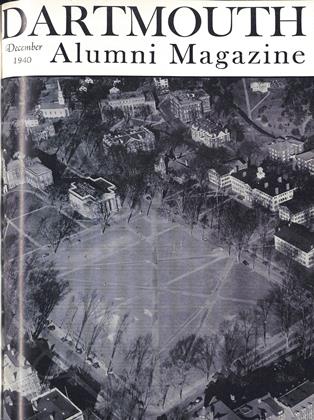PHOTO-FINISH HAS A NEW meaning today in the aftermath of the Dartmouth- Cornell football game. The referee and the scoreboard said that Cornell won, but the films now prove that the referee was in error—which he has promptly acknowledged and that the scoreboard lied. A few flickering shadows on a screen have thus helped to settle a type of dispute that years ago might have dragged on until the players were grandfathers.
They'll be celebrating this at Hanover for a long time, and with good reason. For the Dartmouth team was a hopeless 4-to-i underdog. Nobody really conceded it a chance except the Dartmouth players themselves. They knew that they were facing a team that hadn't been beaten since the 1938 season, but they gave all they had, and won, and scored what the sports writers will call "one of the greatest upsets of all time."
We think, though, that Cornell should be just as proud. The result probably deprived Cornell of the mythical championship of the East; yet the Cornell authorities accepted it without a quiver, and Coach Snavely promptly telegraphed to the coach at Hanover "with hearty congratulations to you and a gallant Dartmouth team." If we were Cornell, we shouldn't trade that telegram for all the team's victories in the past two years. It proves that sportsmanship hasn't died in intercollegiate football. It proves that the sport which is too often described as a "struggle," a "battle" even a "Blitzkrieg," is just a game, for all that.
The New York TimesNovember 19
AMONG ALL of the words in the American . language, none suffers more from over-use than "sportsmanship." It remains in its true form so seldom these days that when it can be truly applied, as it can to Cornell University for conceding that Dartmouth won 3 to o last Saturday, there seems again to be hope for the world. More than that, though, Cornell's magnificent admission of defeat in a game which the undefeated Ithacans believed they won 7 to 3, on an official error, seems to present a good case for amateur college football. It seems to prove that, particularly in the East, the matter of winning the football game still is not death and life and all things too. It seems to prove that the game is fun to play for itself, that professional football cannot be compared to it and never will replace it. And it proves that the members of this Cornell team, now defeated for the first time in almost three seasons, have gained a great deal more than any invitation to the Rose Bowl ever could mean to them.
It is unnecessary to congratulate such a football club for its unprecedented honest action. What the once defeated Cornell team of 1940 has done for amateur football will be remembered long after the dozens of unbeaten and untied wonders of this decade are completely forgotten. it is such as Snavely and Cornell that will save college football from being swampecf by the professionals the way college baseball foundered beneath the waves of PlO fessional baseball.
The New York Herald TribunsNovember 19
 View Full Issue
View Full Issue
More From This Issue
-
 Article
ArticleLike Father, Like Son
December 1940 By PETER STIRLING CARDOZO '39 -
 Article
ArticleAmerican Student Morale
December 1940 -
 Article
ArticleThe Undergraduate Chair
December 1940 By Charles Bolte '41 -
 Class Notes
Class Notes1917*
December 1940 By EUGENE D. TOWLER, DONALD BROOKS -
 Article
ArticleGreen Eleven Makes Gridiron History
December 1940 -
 Class Notes
Class Notes1935*
December 1940 By JOHN D. GILCHRIST JR., BOBB CHANEY
Article
-
 Article
ArticleCHAPEL ORGAN IMPROVED THROUGH RECENT GIFT
February, 1922 -
 Article
ArticleINTERCOLLEGIATE CONFERENCE TAKES STAND AGAINST LIQUOR
June, 1923 -
 Article
ArticleSTUDENTS TUTOR STUDENTS
MARCH 1964 -
 Article
ArticleMicrowaving Cancer
APRIL 1994 -
 Article
ArticleTrack
March 1955 By Cliff Jordan '45 -
 Article
ArticleThayer School
April 1955 By WILLIAM P. KIMBALL '29

